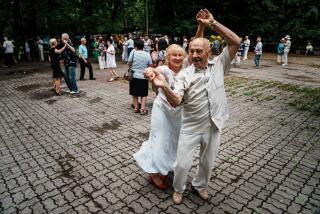NATO Raid Costs Gypsy Her Life
- Share via
BELGRADE, Yugoslavia — She lived in a tiny house in a shabby quarter of Belgrade that could hardly be more obscure.
To get there you must go to Subura, a crowded southern neighborhood, and locate a short street called Vardarska. At No. 8 is a green gate and behind it a warren of one- and two-room stucco homes around a long, narrow courtyard. Sofia Jovanovic lived in the home at the very end.
Somehow, a NATO projectile found its way there in the dark early Friday and ended a startled young woman’s life.
A bomb or missile fired from a NATO jet blew a crater in Vardarska Street two blocks away. Fragments of the projectile exploded across the neighborhood, and some sailed over the green gate to Jovanovic’s front door, which had been blown open by the blast.
Scores, perhaps hundreds, of civilians have been killed by NATO’s bombing of Yugoslavia. The death of Jovanovic, a 23-year-old Gypsy whose people have nothing to do with the fight between Serbs and ethnic Albanians in distant Kosovo province, is a vivid example of the freak circumstances that claimed most of the victims’ lives.
“Papa! Save me!” were the last words a neighbor heard from her. Sliced in the abdomen, groin and legs by a jagged, grayish-green bomb fragment, she slipped into a coma on the way to a hospital and died two days later.
In Belgrade’s Central Cemetery, about 200 mourners stood on top of other people’s tombs Wednesday to watch ropes lower Jovanovic’s white coffin into the damp earth. Her mother, crippled by the spray of metal, wept in a wheelchair as a Serbian Orthodox priest in orange robes chanted a prayer. A leader of the Gypsy community, Jovan Damjanovic, gave the eulogy.
“Today we pay our respects to Sofia, who was killed by the American and NATO aggressors in the doorway of her home,” he said.
Gypsies are an outcast, impoverished minority in Eastern Europe and have felt more than their share of ethnic bullying in the Balkans in the past decade. But NATO’s 6-week-old bombing assault has put Yugoslavia’s 800,000 Gypsies in the same camp with the ethnic Serbs who run the country and often push them around.
“If you Americans want something, why don’t you stop bombing us and come down here and tell it to our face,” said Branislav Stanojevic, a 46-year-old shop assistant who attended the funeral.
NATO is demanding security and autonomy for the ethnic Albanian majority in Kosovo, a province of Yugoslavia’s dominant republic, Serbia. Western leaders say the bombing aims to stop Yugoslav forces that have driven tens of thousands of ethnic Albanians from their homes in Kosovo.
As the air war has intensified in the past week, so have the numbers of wayward missiles and civilian casualties--and the conviction among people on the ground that NATO is trying to terrorize them into submission. The fragment that killed Jovanovic and the missile that destroyed a nearby home were part of an attack that North Atlantic Treaty Organization officials said was aimed at Yugoslav army headquarters more than a mile across town.
In the courtyard where she died, mourners gathered after the funeral to roast a pig and remember the free-spirited woman who doted on her cousin’s child, played soccer with the guys and did a fair imitation of Michael Jackson at her friends’ parties.
“She loved life,” said Komina Muharem, a 16-year-old neighbor.
Solidarity with the Serbs notwithstanding, some neighbors voiced dismay that no one from the government had come to offer condolences.
Dragan Stankovic, a community leader, complained that Gypsies driven out of Kosovo by the bombing were being turned away from government-run refugee camps elsewhere in Serbia. He said about 3,000 Gypsies from Kosovo had been forced to improvise their own shelters here in Belgrade, the Yugoslav and Serbian capital.
Jovanovic and her parents were victims of the same discrimination, he said, because no Serb would give them work. As children, Sofia and her three older brothers had gone to live with their grandparents, who are working in Austria, but she returned to her parents’ home a few years ago to help care for her ailing mother. The family lived on welfare payments of about $20 a month.
Her life changed last spring when Milan Milic, a television repairman from across the Danube in New Belgrade, came to fix her parents’ set. They dated, and on April 24, exactly a month after the NATO bombing started, he gave her an engagement ring.
Ibra and Zhivka Jovanovic agreed to an August wedding for their daughter, but the engagement party was postponed so the relatives from Austria could travel here safely.
Last Thursday night, Sofia sat outside with her neighbors, Goran and Tamara Stankovic, fretting about her war-delayed happiness. The bombing had seemed frightening at first, but she had become bored by long nights in the neighborhood’s bomb shelter and had stopped going about a week earlier.
It was 1:30 a.m. when the three of them went inside their homes. An explosion rocked the neighborhood half an hour later, setting off the Stankovics’ car alarm. Sofia and her mother were in the doorway when another blast, a few seconds later, cut them down.
“I was in shock for a few seconds, and then I heard screams,” said Goran Stankovic, who grabbed a blanket off his clothesline, bundled Sofia into the back seat of his aging Mercedes-Benz and raced to a hospital on the heaviest night of bombing in Belgrade.
The next day, the neighbors collected metal fragments from all over the courtyard and turned the biggest pieces over to Serbian police. Fearful about rumors that NATO is dropping radioactive bombs, they threw the smaller pieces away.
More to Read
Sign up for Essential California
The most important California stories and recommendations in your inbox every morning.
You may occasionally receive promotional content from the Los Angeles Times.










